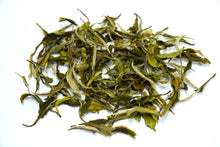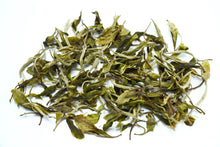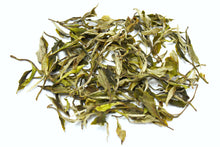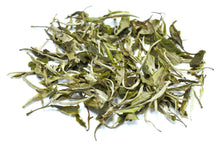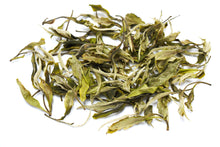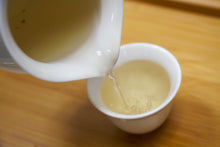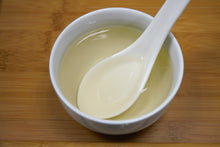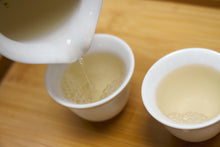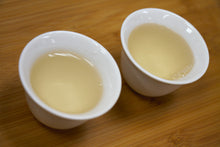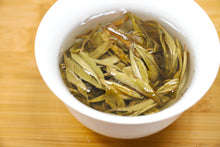
Bai Mu Dan, also known as White Peony, is a distinguished type of white tea that hails from China. It is recognized as one of the traditional and most esteemed varieties of white tea.
Bai Mu Dan undergoes minimal processing, meaning the tea leaves experience very little oxidation. This careful approach typically involves withering and drying the leaves under controlled conditions, which helps preserve their natural characteristics. Like other types of white tea, Bai Mu Dan is prized for its potential health benefits, attributed to its high antioxidant content and lower caffeine levels. It is often believed to promote relaxation, aid digestion, and support overall well-being.
Tea enthusiasts appreciate Bai Mu Dan for its subtle complexity, which captures the essence of the tea plant beautifully. This makes it a favored choice for those eager to explore the world of white teas or for individuals seeking a mild and soothing tea experience.
This particular Bai Mu Dan is a rare variety produced from ancient tea trees that grow in a natural farming garden located at an elevation of over 2000 meters in Lincang, Yunnan, China. Each twig of tea leaves is meticulously hand-picked during the spring season. The resulting brew offers a refreshing floral note complemented by a hint of sweet fruity undertones, creating a smooth drinking sensation with a pleasantly sweet finish.

Scenery of where we collected tea
A special limited edition set of ancient tree white tea from five different tea gardens

This year, we have specifically introduced Bai Mu Dan from five carefully selected tea gardens. After being harvested in early spring, the tea leaves were aged in an oxygen-free environment for several months to enhance their fragrance, ultimately achieving the desired aroma. The tea is now ready for shipment at any time.
Due to the limited production of white tea, each tea garden has a small yield. Therefore, we process the raw tea materials from different gardens sequentially over about ten days. After mixing these materials, we release the white tea. However, to allow customers to experience the unique flavors of each tea garden, we have decided to offer tasting sets for each garden before blending, enabling easy comparison.
Fresh green ancient tree white tea from Yunnan is quite rare in China.
We collaborate with tea farmers from a village located in the southwestern part of Lincang, at an altitude of about 2000 meters, where they have numerous ancient tea gardens. Initially, these farmers were responsible for caring for the ancient tea gardens passed down by their ancestors. In the past, they would harvest fresh tea leaves and sell them to tea factories. In 2018, we encountered them while searching for naturally farmed tea gardens.
We provided them with comprehensive training, covering aspects such as equipment design, tea processing methods, and management practices. Following this, we began to involve them in the production of white tea.

What we emphasize is not the typical brownish white tea found in Yunnan Province but rather the production of white tea with a fresh green hue. This white tea is crafted from the leaves of centuries-old naturally grown ancient tea trees situated at elevations ranging from 2000 to 2300 meters. White tea, meticulously managed and cultivated in this manner, is not only a rarity in Yunnan Province but also a highly unusual tea variety throughout China as a whole.

The characteristics of tea vary from one tea garden to another
The tea gardens in Yunnan Province can be described as "tea mountains." Unlike the well-organized tea fields in Japan or Taiwan, here you'll find small tea gardens scattered along the slopes of the mountains, consisting of anywhere from a few to several dozen tea trees. Some of these gardens are located as far as 5 kilometers from the nearest homes, requiring access by foot, making the journey to and from the tea gardens quite an exercise in itself.


Small tea gardens, consisting of ancient tea trees like those in the photos, are scattered throughout the mountains.

The small tea gardens are scattered throughout the mountains. Due to this unique growing environment, even within tea gardens owned by the same producer, differences in factors such as sunlight, the age of tea trees, soil quality, and more exist because they are scattered throughout the mountains. These variations contribute to the diverse characteristics of the tea.
Before blending, we offer limited edition tasting sets for each tea garden
Our tea producer processes tea on a per-tea-garden basis, and teas harvested on different days are managed as separate lots. Even when importing to Malaysia, each lot is imported individually, without blending. The reason for this approach is that there are instances when certain lots exhibit subtle differences in quality, often due to unexpected rainy weather during the processing period. Consequently, if all these lots were mixed on-site, there would be a risk of blending problematic batches.
At our store, after importing tea, we conduct quality assessments for each lot, and only those lots that meet our quality standards are blended and processed into our white tea.
White tea, due to its simple processing method, allows the distinct characteristics of the raw materials to shine through. Factors like the elevation of the tea garden, soil composition, sunlight exposure, and the age of the tea trees all contribute to the diversification of aroma and flavor profiles, even within the same category of white tea. Therefore, it wouldn't be an exaggeration to say that if there are ten varieties of white tea, there are ten unique aromatic profiles. Tasting white teas produced from different tea gardens is genuinely an exciting experience. With the desire to share this excitement, we have decided to offer small tasting sets, organized by tea garden, before blending each lot.
White tea that changes when infused with water
HOJO's white tea is unique in that no heat is used during its processing. Consequently, unlike other types of tea such as green tea, black tea, oolong tea, or pu-erh tea, the enzymes within the tea leaves are preserved in their active state. This is why when you steep the tea in hot water, the enzymes are activated during the brewing process, causing a slight fermentation.
Conversely, by cold brewing the tea, you can enjoy a completely different aroma compared to white tea steeped in hot water because it's less likely for the enzymes to activate. As we continue to experience warm days, we encourage you to try cold brewing.
Cold brewing white tea offers a refreshing taste, almost like "tea juice." Additionally, if you brew it stronger and then dilute it with hot water, you can enjoy the aroma from cold brewing while still having a hot cup of tea.
White tea is suitable for aging (long-term storage)
Our white tea is vacuum-sealed (oxygen-free environment), so its freshness will remain even if stored at room temperature for several years to several decades. However, white tea undergoes maturation over time when stored for an extended period. With long-term storage, it develops a sweet aroma reminiscent of honey or dried fruits.
You can purchase the special limited set of white tea from five different tea gardens here.
This set consists of five distinct varieties of tea, each offering its unique flavors and aromas for you to enjoy.

Due to limited stock availability, we will be offering a limited quantity for sale. Once the planned quantity is sold out, it will be considered as "out of stock." We encourage those who are interested to make a prompt purchase.










